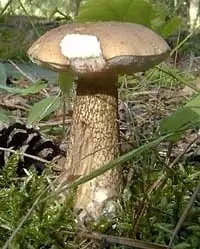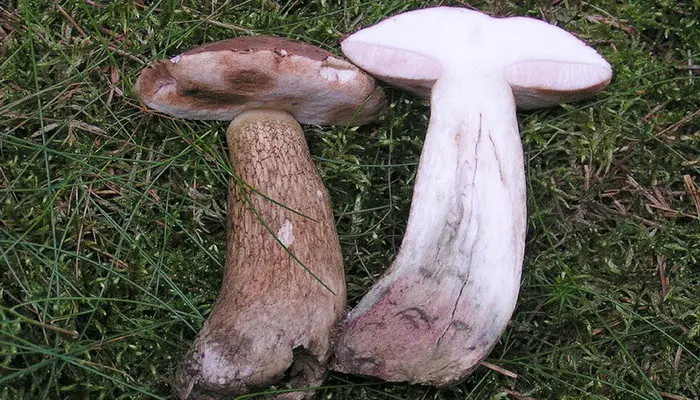Gall fungus (Tylopilus felleus)
- Division: Basidiomycota (Basidiomycetes)
- Subdivision: Agaricomycotina (Agaricomycetes)
- Class: Agaricomycetes (Agaricomycetes)
- Subclass: Agaricomycetidae (Agaricomycetes)
- Order: Boletales (Boletales)
- Family: Boletaceae (Boletaceae)
- Genus: Tylopilus (Tilopil)
- Type: Tylopilus felleus (Bile mushroom)
- Gorchak
- false porcini mushroom
 gall fungus (lat. Tylopilus felleus) is an inedible tubular fungus of the genus Tilopil (lat. Tylopilus) of the Bolet family (lat. Boletaceae) due to its bitter taste.
gall fungus (lat. Tylopilus felleus) is an inedible tubular fungus of the genus Tilopil (lat. Tylopilus) of the Bolet family (lat. Boletaceae) due to its bitter taste.
head up to 10 cm in ∅, , to old age, smooth, dry, brownish or brownish.
Pulp , thick, soft, turning pink on the cut, odorless, tastes very bitter. The tubular layer is white at first,
then a dirty pink.
Spore powder pink. Spores fusiform, smooth.
Leg up to 7 cm long, from 1 to 3 cm ∅, swollen, creamy-buffy, with a dark brown mesh pattern.
The gall fungus grows in coniferous forests, mainly on sandy soil, rarely and not abundantly from July to October.
Bile mushroom is inedible because of the bitter taste. Outwardly similar to the boletus. When cooking, the bitterness of this mushroom does not disappear, but rather increases. Some mushroom pickers soak the gall fungus in salt water to get rid of the bitterness, then cook it.
Scientists agree that eating gall fungus is impossible only because of its unpleasant taste.
Foreign colleagues refute this theory. In the pulp of the gall fungus, toxic substances are released that are quickly absorbed into the human blood during any, even tactile, contacts. These substances penetrate into the liver cells, where they show their destructive effect.
On the first day after the “tongue test” during the collection of this fungus, a person may feel slight dizziness and weakness. In the future, all symptoms disappear. The first signs appear after a few weeks.
Problems begin with the separation of bile. The functioning of the liver is impaired. At high concentrations of toxins, cirrhosis of the liver may develop.
Thus, you yourself can draw the correct conclusion about whether the gall fungus can be eaten and whether it is edible for humans. One has only to think about the fact that even forest animals, insects and worms do not try to feast on the attractive pulp of this representative of the mushroom kingdom.

A young gall fungus with still unpainted pores can be confused with porcini and other boletus mushrooms (netted boletus, bronze boletus), sometimes it is confused with boletus. It differs from boletus mushrooms by the absence of scales on the stem, from mushrooms by a dark mesh (in mushrooms, the mesh is lighter than the main color of the stem).
A mushroom containing specific bitterness has been proposed as a choleretic agent.









